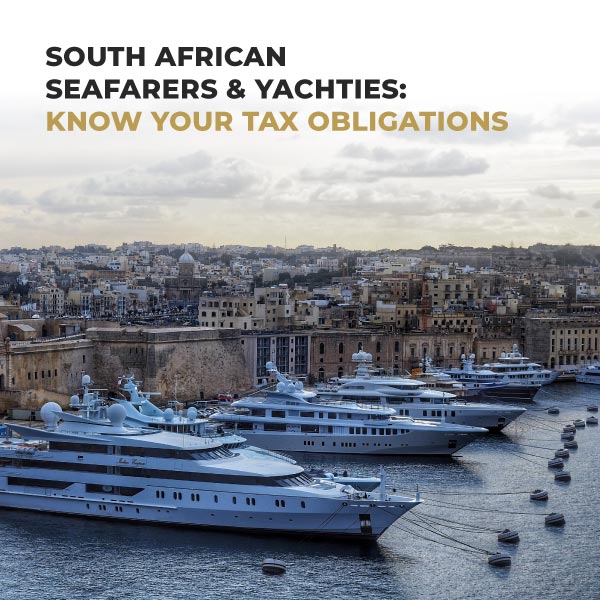SOUTH AFRICAN SEAFARERS AND YACHTIES
KNOW YOUR TAX OBLIGATIONS
As most know by now, SARS is grappling to increase revenue for their coffers, looking to South Africans who earn foreign income to subsidise the deficit. With all the uncertainty around the change in the foreign employment income exemption, which is coming into effect as of 1 March 2020, more and more people are wanting to get their tax affairs in order so to ensure that they are compliant with SARS.
One of the biggest issues which has surfaced is that many seafarers and superyacht crew (colloquially known as “yachties”) are not even registered for tax in South Africa, yet they have remaining assets in South Africa to include shares, trusts, properties and policies as well as resident bank account/s.
Donné Trump of Seafarers Global has stated that “it is imperative that as long as you are a South African tax resident or have income or assets in South Africa, you have to be registered for tax. As a tax resident, your worldwide income must be declared to SARS and seafarers have their very own exemptions in place to ensure they acquire the relevant tax relief.”
Complexities For Seafarers
In determining your tax liability working at sea, be it on fishing vessels, exploration ships, luxury liners, yachts, tankers or container ships, a few factors need to be taken into consideration.
“The position of seafarers is more complex than the standard foreign employee in that South African tax law provides for three different categories of exemption, which can be applied for on foreign income”, says Jonty Leon, Legal Manager of Financial Emigration. “There are various categories that a seafarer may fall into depending on their own unique situation, and most are unaware of these differences, this often creates uncertainty and a tendency for people to get the wrong advice.”
The exemptions are categorised as follows:
- Salaries paid to an officer or a crew member of a ship Section 10(1)(o)(i)(aa) and (bb); or
- Foreign Employment Income earned outside of South Africa Section 10(1)(o)(ii).
The complexity is highlighted by the fact that seafarers work alongside colleagues with different tax circumstances, i.e. one could be exempt from tax in SA, whilst the other taxable. Something as simple as the mere position held by the seafarer, or the title on the vessel can affect this. Thus, seafarers need to understand the law and how it applies to their individual circumstances to be able to protect their foreign earned income.
Uncertainty also creates anxiety in people, however once you understand your personal situation and seek professional assistance, you are in a position to make use of the options that you have available to you.
Where Do Yachties Fit In?
Yachties should specifically be looking at Section 10(1)(o)(i)(aa) in order to determine whether they can take advantage of this exemption. They will need to ensure that the yacht upon which they are employed is a charter yacht used for the purposes of transporting passengers or goods. Should they not meet the requirements to make use of Section 10(1)(o)(i)(aa), they may then consider making use of Section 10(1)(o)(ii) for tax relief.
In terms of Section 10(1)(o)(ii), remuneration received by an employee for services rendered outside of South Africa for or on behalf of the employer will be tax exempt. As of 1 March 2020, this exemption will be limited to the first R1 million. In order to qualify for this exemption, the following requirements must be met:
- There must be an employer-employee relationship;
- There must be remuneration received in respect of services rendered;
- The taxpayer must be outside of SA for a period / periods exceeding 183 day in total during any 12 month period; and
- The taxpayer must be outside of SA for a continuous period of 60 full days during that same period of 12 months.
Dispelling The Myth: No Penalties For Registering
There seems to be a dangerous myth, especially amongst seafarers and yachties, that if one registers for tax, they may automatically be subject to fines or penalties. This myth is one of the major contributors as to why non-compliance is rife in the seafarer market. It is imperative that this myth is dispelled as it is likely be more harmful in the long run.
Donné Trump emphasises that “when registering for tax, one will be seen as a new registrant and will have a date of liability from date of registration. From this date going forward, the taxpayer will need to file tax returns, depending on their tax residency status, either on worldwide income or merely South African sourced income.”
Secure Your Home Port
The longer one is non-compliant, the higher the chances this will impact the taxpayer negatively. Thus, if one meets the requirements to be registered for tax in SA, this should be done without fail or delay. Once this is done, the profile must be kept compliant, with income being declared annually and the correct tax relief methods / exemptions being used. As long as you are an individual who is a South African tax resident earning income, SARS can still find you and you will still be liable to pay taxes in South Africa.
![2025-logo-[Recovered] Tax Consulting South Africa](https://www.taxconsulting.co.za/wp-content/uploads/2025/01/2025-logo-Recovered.png)

